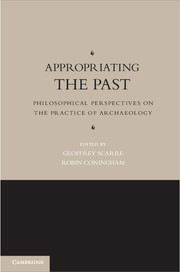Book contents
- Frontmatter
- Contents
- Contributors
- Editors
- Chapter 1 Introduction
- Part One Claiming the Past
- Chapter 2 The Values of the Past
- Chapter 3 Whose Past? Archaeological Knowledge, Community Knowledge, and the Embracing of Conflict
- Chapter 4 The Past People Want
- Chapter 5 The Ethics of Repatriation
- Chapter 6 On Archaeological Ethics and Letting Go
- Chapter 7 Hintang and the Dilemma of Benevolence
- Part Two Problems of Meaning and Method
- Part Three Problems of Ownership and Control
- References
- Index
- References
Chapter 5 - The Ethics of Repatriation
Rights of Possession and Duties of Respect
Published online by Cambridge University Press: 05 December 2012
- Frontmatter
- Contents
- Contributors
- Editors
- Chapter 1 Introduction
- Part One Claiming the Past
- Chapter 2 The Values of the Past
- Chapter 3 Whose Past? Archaeological Knowledge, Community Knowledge, and the Embracing of Conflict
- Chapter 4 The Past People Want
- Chapter 5 The Ethics of Repatriation
- Chapter 6 On Archaeological Ethics and Letting Go
- Chapter 7 Hintang and the Dilemma of Benevolence
- Part Two Problems of Meaning and Method
- Part Three Problems of Ownership and Control
- References
- Index
- References
Summary
In 1910 and 1911, a Swedish zoologist and adventurer, Eric Mjöberg, raided Aboriginal graveyards in Queensland and the Kimberleys. His purpose was to establish, by a study of their remains, that Aborigines were the missing link between apes and humans. He smuggled these remains out of Australia as ‘kangaroo bones’, and eventually some of his collection ended up in the Swedish Museum of Ethnography. A book recently published by an anthropologist led to a public outcry against Mjöberg's activities, and in 2004 the museum agreed to return bones to communities in the Kimberleys to which some of them were traced.
This is one of a large number of cases where museums and research institutions have been persuaded or forced to surrender artefacts and human remains to those who are believed to be the rightful possessors. Demands for repatriation raise difficult moral issues that must be faced both by those curators and archaeologists who are predisposed to resist the demands and by those who are inclined to be sympathetic to the position of the claimants. There are two fundamental questions that need to be answered to arrive at a defensible position. First of all, we need to know when, if ever, claims for repatriation are legitimate (and when they are not). Who counts as the rightful possessors of the artefact or the remains, and what criteria should decide the matter? The second issue is whether other considerations – for example, the value of scientific research or respect for religious beliefs – can override legitimate claims to possession.
- Type
- Chapter
- Information
- Appropriating the PastPhilosophical Perspectives on the Practice of Archaeology, pp. 82 - 97Publisher: Cambridge University PressPrint publication year: 2012
References
- 1
- Cited by



